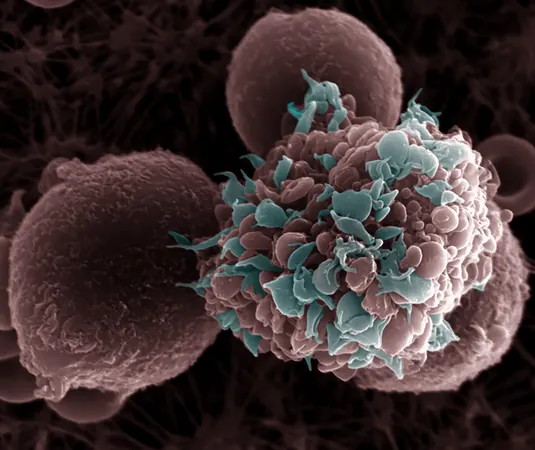
Shocking Discovery: High-Fat Diet Linked to Escalated Breast Cancer Metastasis in Animal Studies!
2025-04-02
Author: Sarah
Introduction
Recent findings from researchers at the Spanish National Cancer Research Center (CNIO) reveal a troubling connection between high-fat diets and the aggressive spread of breast cancer in animal models. As obesity rates soar globally, understanding how diet influences cancer progression is more critical than ever.
Research Overview
Led by Héctor Peinado, head of the CNIO's Microenvironment and Metastasis Group, the team published their groundbreaking study in Nature Communications, uncovering mechanisms that promote metastasis in triple-negative breast cancer—a particularly aggressive form of the disease known for its poor prognosis and lack of targeted therapies.
Mechanisms of Metastasis
The study elucidates how a high-fat diet sets off a series of biological responses that enable cancer to migrate from its original site to other organs, notably the lungs. The journey of tumor cells from the primary tumor through the bloodstream is impeded by various factors, including the creation of a "premetastatic niche." This preparatory environment is orchestrated by the primary tumor, which emits signals that prime target organs for its malignant cells.
Effects of Obesity on Metastasis
One of the startling outcomes of the research shows that obese mice on a high-fat diet experience alterations that facilitate the formation of this niche in their lungs. Notably, there is an increase in platelet activation and blood clotting capabilities, along with the heightened presence of fibronectin—a protein crucial for cell connectivity in lung tissue.
Obesity’s Role in Clotting and Cancer Defense Evasion
The study emphasizes the well-documented correlation between obesity and increased blood clotting, underscoring the role of platelets. In high-fat diet models, these platelets appear to encase cancer cells, possibly obscuring them from the immune system's detection. "This 'armor' formed by platelets could shield tumor cells, allowing them to evade immune surveillance and proliferate unchecked," explains Peinado.
Furthermore, the increased fibronectin not only aids in establishing a conducive environment for metastasis but also enhances the interaction between tumor cells and platelets. "Our findings show that fibronectin regulates how tumor cells interact with both the lung endothelium and platelets," notes Peinado.
Human Cancer Dynamics
To bridge their animal research with human implications, the CNIO's Breast Cancer Clinical Research Unit, led by Miguel Ángel Quintela, examined blood samples from triple-negative breast cancer patients before surgery and following chemotherapy. While not a direct link was established between obesity and metastasis, a troubling correlation emerged: patients exhibiting increased blood coagulation—indicated by shorter prothrombin times—showed a significantly elevated risk for cancer relapse within five years.
Clinical Implications
Peinado suggests that these insights could be pivotal for identifying additional risk factors, improving clinical management strategies for breast cancer sufferers.
Future Directions in Treatment
The collaborative study explored potential clinical applications stemming from their results, including dietary modifications in animal models. Remarkably, when these mice were taken off the high-fat regimen, their weight loss led to normalized platelet and coagulation behavior, diminishing the occurrence of metastases.
As scientists continue to decode the complex interplay between diet and cancer dynamics, this research opens up exciting avenues for innovative treatments, possibly paving the way for more personalized dietary recommendations for breast cancer patients. With obesity being a growing epidemic, understanding and addressing its implications in cancer treatment could be a lifesaver. Stay tuned as we delve deeper into how these findings might reshape cancer care in the future!




 Brasil (PT)
Brasil (PT)
 Canada (EN)
Canada (EN)
 Chile (ES)
Chile (ES)
 Česko (CS)
Česko (CS)
 대한민국 (KO)
대한민국 (KO)
 España (ES)
España (ES)
 France (FR)
France (FR)
 Hong Kong (EN)
Hong Kong (EN)
 Italia (IT)
Italia (IT)
 日本 (JA)
日本 (JA)
 Magyarország (HU)
Magyarország (HU)
 Norge (NO)
Norge (NO)
 Polska (PL)
Polska (PL)
 Schweiz (DE)
Schweiz (DE)
 Singapore (EN)
Singapore (EN)
 Sverige (SV)
Sverige (SV)
 Suomi (FI)
Suomi (FI)
 Türkiye (TR)
Türkiye (TR)
 الإمارات العربية المتحدة (AR)
الإمارات العربية المتحدة (AR)